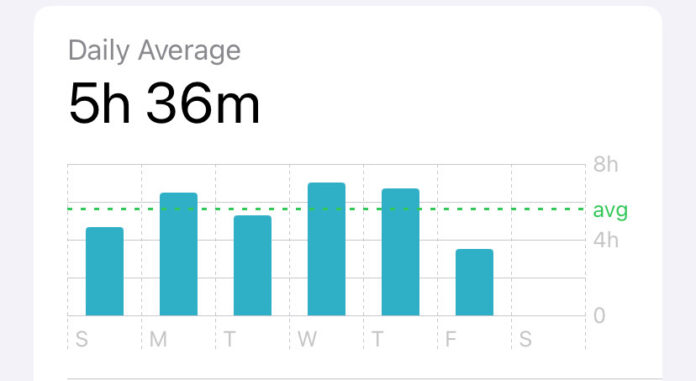Maybe you know the feeling: you get home from work or class and open up your phone to check a few small things. Suddenly, you blink and it’s 10 p.m. and time for the day to end. Where did the last five hours go? The last three days? The last month?
As the years go by and technology becomes more advanced at unprecedented rates, companies are constantly finding more to steal our attention for as long as they can. It’s something they’ve become very good at, and not by accident.
According to The National Library of Medicine, “app developers have a keen interest in designing their online platforms with the goal to keep users occupied as long as possible.” The data collected by these apps creates more effective opportunities to target you with things like customized ads. Essentially, the longer you’re on your phone, the more likely it is they can squeeze some money out of you somehow.
Phone addiction can have devastating effects on our mental health, including heightened depression and anxiety, worse sleep, and an epidemic of loneliness. Todd Avani, professor of the Addiction and Human Behaviors (PSYC-265) course at KCC, explained how and why our phones have been negatively affecting us.
“A growing body of research is pointing to a powerful link between excessive use of smartphones/social media and spikes in anxiety and depression,” Avani said. “Jonathan Haidt, a social psychologist at NYU, has been looking at the detrimental effects of smartphone and social media use during childhood and early adolescence. According to his research, rates of mental health were relatively stable up until around 2010. Then, around 2019, it was found that anxiety and depression rates had risen sharply in not only American undergraduate students, but also undergraduate students in several other countries. Haidt contends that smartphone access and the use of social media have been the driving forces behind those rates.”
You’ve likely noticed some of these side effects yourself. Our phones undoubtedly make us talk to the people around us less. Constantly being bombarded with bad news can raise our anxiety levels greatly. We can feel as though all of our time has been wasted on 60-second videos you can’t even remember 10 seconds after you’ve closed the app. Despite this, many people don’t believe that phone addiction is real at all – just put the phone down, you know? Unfortunately, it’s not always that simple.
“Behavioral addictions do share several characteristics with substance-related addictions. For example, both forms of addiction stimulate the brain’s mesolimbic dopamine pathway, often referred to as the ‘reward pathway’. This pathway ‘speaks’ through the dopamine neurotransmitter. When we engage in behaviors we enjoy, an uptick in dopamine release within the pathway reinforces the behavior and makes it more likely that we’ll engage with the behavior again in the future; the uptick being responsible for the feelings of pleasure and reward that we associate with the behavior,” Avani said. “In the case of smartphones/social media, engaging in the behavior drives the release of dopamine in the initial stages. At some point, notifications and other sounds associated with the behavior act as an impetus to trigger release. Eventually, the simple anticipation of engagement with the device and social media will be sufficient.”
As the years go on this phenomenon will only get worse without intervention, especially as the younger generations start to join the online space.
“When kids gained access to smartphones and social media, they moved from a life filled with the various forms of play required for healthy social, psychological, and emotional development, to a life that has been spent online,” Avani said.
You may be embarrassed when your weekly screen time reports show you’ve been on your phone for 6 or more hours a day. You may find yourself wishing you had more time for things like hobbies or building relationships after work or school. Maybe you’ve already tried short-term solutions like setting up screen time restraints that are far too easy to turn off. How can we break the cycle for good?
You can try to find ways to make your phone less appealing. This includes deleting “fun” apps, turning off all notifications, changing your backgrounds to a solid black or white one, or even going as far as turning your entire phone to grayscale so those appealing color schemes are nowhere to be found. If this isn’t quite enough, you could also try:
- Keeping your phone in a different room when doing things like studying, spending time with family and friends, or even sleeping.
- Purchasing a timed lock box to put your phone in for a predetermined amount of time.
- ScreenZen, an app that forces you to stop and think before mindlessly opening apps. You can block apps during certain time frames, have apps available for only 10 or 20 minutes at a time, have tasks you must complete like math problems or word games before you can open an app, and many other ways to add some friction that may make you change your mind. (This is the one that has worked best for me personally.)
- Making a list of some things you’d rather do, and being sure to actually go do them. Chances are you won’t even miss that phone if you’re finding more satisfaction doing something else.
- Some even go as far as purchasing a “dumb phone” that does nothing but call, text, and take photos.
Our phones introduce us to a million things specifically designed to take our attention away from anything else. While many may be able to resist temptation, there are millions who find themselves stuck in a cycle of nothing but screens day and night. Luckily, the world around us is and always has been beautiful if you’re willing to be “bored” for a second and pay attention to it. It may be hard, as it often is for me, but try to put those screens away, go outside, and notice the things you may have been missing out on.























